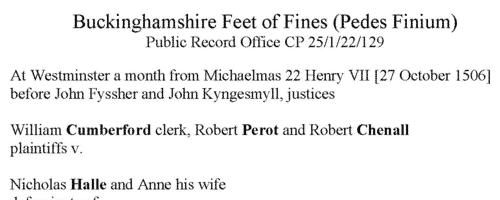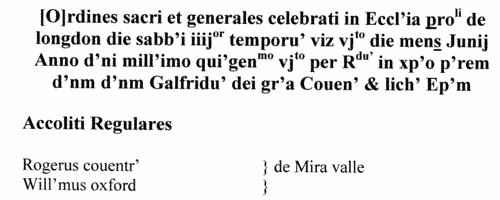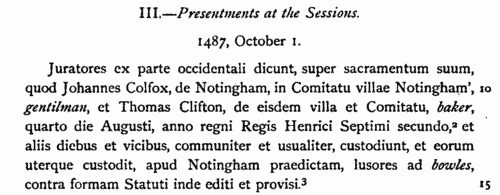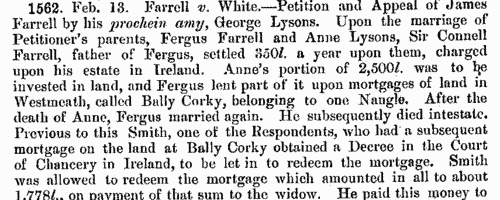Perot Surname Ancestry ResultsOur indexes 1000-1999 include entries for the spelling 'perot'. In the period you have requested, we have the following 55 records (displaying 41 to 50): Single Surname Subscription | | | Buying all 55 results of this search individually would cost £280.00. But you can have free access to all 55 records for a year, to view, to save and print, for £100. Save £180.00. More... |
These sample scans are from the original record. You will get scans of the full pages or articles where the surname you searched for has been found. Your web browser may prevent the sample windows from opening; in this case please change your browser settings to allow pop-up windows from this site. Buckinghamshire Pedes Finium (1506)
Sales of land were registered by means of fictitious suits of covenant entered in the Common Pleas, the details of which were recorded in separate parchment indentures called Feet of Fines or Pedes Finium. This calendar gives an abstract of each deed: in most cases the seller is the deforciant, the purchaser is the plaintiff, and the land is described in the broadest terms, as so many messuages, tofts, gardens, acres of (arable) land, meadow, pasture, woodland, furze and heath, rents &c. The properties range from large manors to single houses or plots of land. The calendar is indexed by the surnames of sellers, purchasers and trustees.
PEROT. Cost: £8.00.  | Sample scan, click to enlarge

| Lichfield Diocese Ordinations: Acolytes Secular
(1506)
The diocese of Coventry and Lichfield at this period included the whole of Cheshire, Staffordshire and Derbyshire; all Lancashire south of the Ribble; northern Shropshire (including Shrewsbury); and northern Warwickshire (including Birmingham and Coventry). Ordinations took place on the four Ember Saturdays in the year, and on certain other occasions; lists of ordinands to the degrees of acolyte, subdeacon, deacon and priest were preserved in the ordination registers, a distinction being made between those clerks who were 'regular', i. e., monks, friars, &c., and those who were 'secular', the main body of the clergy. All ordinands were celibate, and those regular, and the secular who obtained benefices, remained so, but only a minority of the secular ordinands ever obtained benefices, and most will doubtless have married later in life. No man might be ordained to subdeacon or higher without proving either that he was of independent means or that he was sponsored by an institution or a gentleman. Most entries in the register of such ordinations therefore have the words 'ad titulum' followed by the name of the religious house that was the sponsor. This is an important indication of the man's origins - boys whose families were monastic tenants, and who were educated by the monks, would naturally be sponsored by the abbey. Only men who were born and bred in the diocese could be ordained by the bishop, unless producing letters dimissory from the bishop of the diocese of their birth. These are the ordinations celebrated on Ember Saturday, 19 December 1506, by bishop Geoffrey Blythe, in Longdon parish church.PEROT. Cost: £8.00.  | Sample scan, click to enlarge

| Poor English Pilgrims in Rome
(1506)
Registers of English pilgrims staying in Rome, preserved among the archives of the English College, were extracted by W. C. Trevelyan and communicated to the Rev. John Hodgson, who published them in 1838. Two separate lists were maintained - of the rich and nobles, and of the poor. Both lists give date, full name, and diocese of origin in England and Wales.PEROT. Cost: £6.00.  | Sample scan, click to enlarge

| Inhabitants of Nottingham
(1485-1547)
The muniments of the borough of Nottingham include extensive mediaeval archives. A selection from these from the reigns of Henry VII and Henry VIII was prepared and edited by W. H. Stevenson for the Corporation, and printed, with translations of the passages in Latin, in 1885. The principal sources used are the borough Court Books, largely dealing with civil cases, for which an almost complete series survives for this period; Sessions Rolls (92 survive for the two reigns), in which crimes and misdemeanours are recorded; a Mickletorn or Leet jury roll; detailed chamberlains' and bridge-wardens' accounts; and the Hall Books, or council minutes. There are lists of burgesses enrolled; bakers admitted to bake; and fines for licences to trade. A subsidy roll of 1523-4 lists householders by street, and there is an appendix of local deeds, including some material dating back to the 14th century. PEROT. Cost: £4.00.  | Sample scan, click to enlarge

| Tradesmen of York
(1272-1558)
No man or woman could trade in the city of York without having obtained 'freedom' of the city.Their names were recorded on the 'Freemen's Roll', or Register of the Freemen of the City of York, which contains about 19,900 names for this period. A list of names was prepared for each year, the year being here reckoned as starting at Michaelmas (29 September) until 1373, and thence at Candlemas (2 February). Each annual list starts with the name of the mayor and the camerarii or chamberlains. The chamberlains were freemen charged with the duty of receiving the fees of the new freemen; of seeing that only freemen traded in the city; and of preparing this roll, which was compiled from the names on their own account books from the receipts for the fees. There are three groups of freemen: those who obtained freedom after serving out an apprenticeship to a freeman; the children of freemen; and those who claimed freedom by 'redemption', i. e. by purchase or gift from the Mayor and Court of Aldermen.
PEROT. Cost: £2.00.  | Sample scan, click to enlarge

| Testators and legatees in London
(1358-1688)
The Court of Husting of the city of London sat (usually on a Monday) each week: among its functions was the enrolment of deeds and wills relating to citizens of London. In their strictest technical sense the terms 'will' and 'devise' are appropriate to real estate, and the terms 'testament', 'bequest' and 'legacy' to personal estate, but this distinction is lost sight of in ordinary usage. This calendar of wills proved and enrolled in the Court of Husting was edited by Reginald R. Sharpe, records clerk in the office of the Town Clerk of the City of London, and printed by order of the corporation in 1890. The date of the court is given in italics, with the year in bold in the margin. The testator's name is given in capitals (surname first, in bold), and then a brief listing of substantial bequests, with the names of legatees, and then the date of making of the will, and reference. The bulk of the wills in this volume are from before 1600. PEROT. Cost: £4.00.  | Sample scan, click to enlarge

| Allegations for marriages in southern England
(1687-1694)
The province or archbishopric of Canterbury covered all England and Wales except for the northern counties in the four dioceses of the archbishopric of York (York, Durham, Chester and Carlisle). Marriage licences were generally issued by the local dioceses, but above them was the jurisdiction of the archbishop, exercised through his vicar-general. Where the prospective bride and groom were from different dioceses it would be expected that they obtain a licence from the archbishop; in practice, the archbishop residing at Lambeth, and the actual offices of the province being in London, which was itself split into myriad ecclesiastical jurisdictions, and spilled into adjoining dioceses, this facility was particularly resorted to by couples from London and the home counties, although there are quite a few entries referring to parties from further afield. The abstracts of the allegations given here usually state name, address (street in London, or parish), age, and condition of bride and groom; and sometimes the name, address and occupation of the friend or relative filing the allegation. Where parental consent was necessary, a mother's or father's name may be given. The ages shown should be treated with caution; ages above 21 tended to be reduced, doubtless for cosmetic reasons; ages under 21 tended to be increased, particularly to avoid requiring parental consent; a simple statement 'aged 21' may merely mean 'of full age' and indicate any age from 21 upwards. These are merely allegations to obtain licences; although nearly all will have resulted in the issuing of the licence, many licences did not then result in marriage. PEROT. Cost: £4.00.  | Sample scan, click to enlarge

| House of Lords Proceedings
(1699-1702)
Private bills dealing with divorce, disputed and entailed estates: petitions, reports and commissions: naturalisation proceedings.
PEROT. Cost: £4.00.  | Sample scan, click to enlarge

|  Masters and Apprentices
(1713) Masters and Apprentices
(1713)
Apprenticeship indentures and clerks' articles were subject to a 6d or 12d per pound stamp duty: the registers of the payments usually give the master's trade, address, and occupation, and the apprentice's father's name and address, as well as details of the date and length of the apprenticeship. 1 January to 31 December 1713.PEROT. Cost: £8.00.  | Sample scan, click to enlarge

|  Masters of Apprentices
(1770) Masters of Apprentices
(1770)
Apprenticeship indentures and clerks' articles were subject to a 6d or 12d per pound stamp duty (late payment of the 6d rate attracted double duty (D D) of 12d): the registers of the payments usually give the master's trade, address, and occupation, and the apprentice's name, as well as details of the date and length of the apprenticeship. 2 January to 31 December 1770.PEROT. Cost: £8.00.  | Sample scan, click to enlarge

|
Research your ancestry, family history, genealogy and one-name study by direct access to original records and archives indexed by surname.
|













